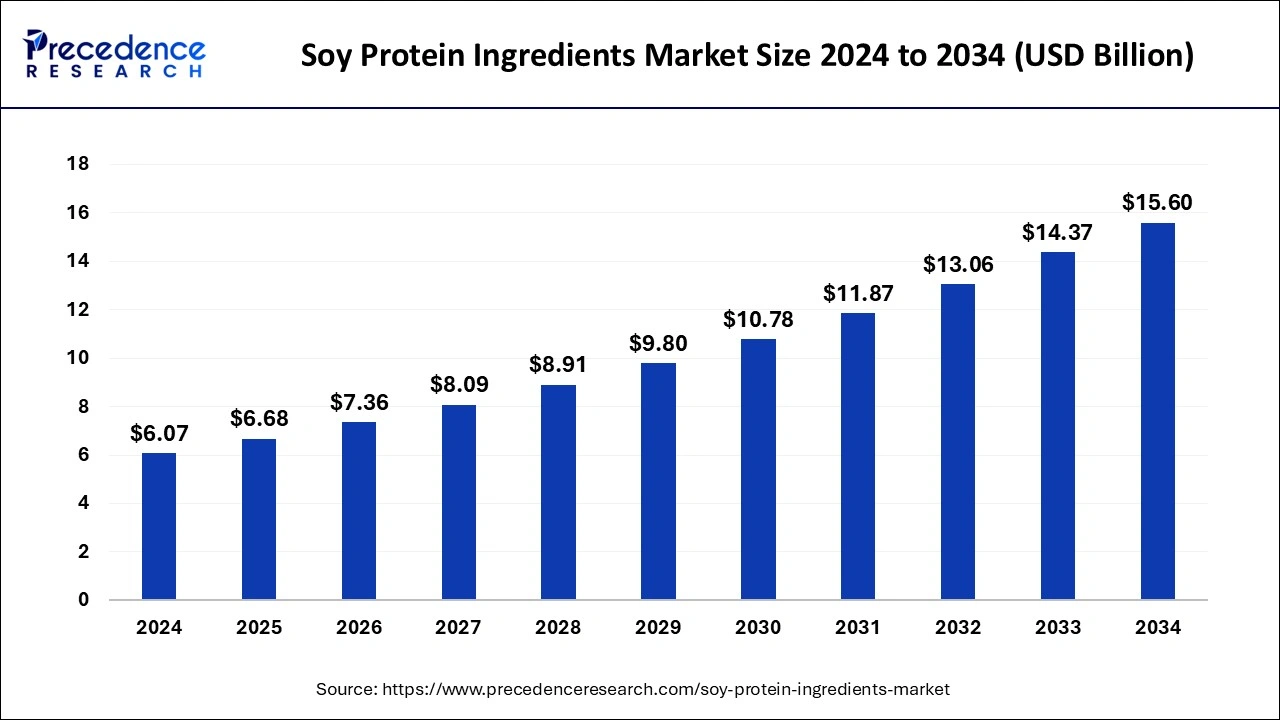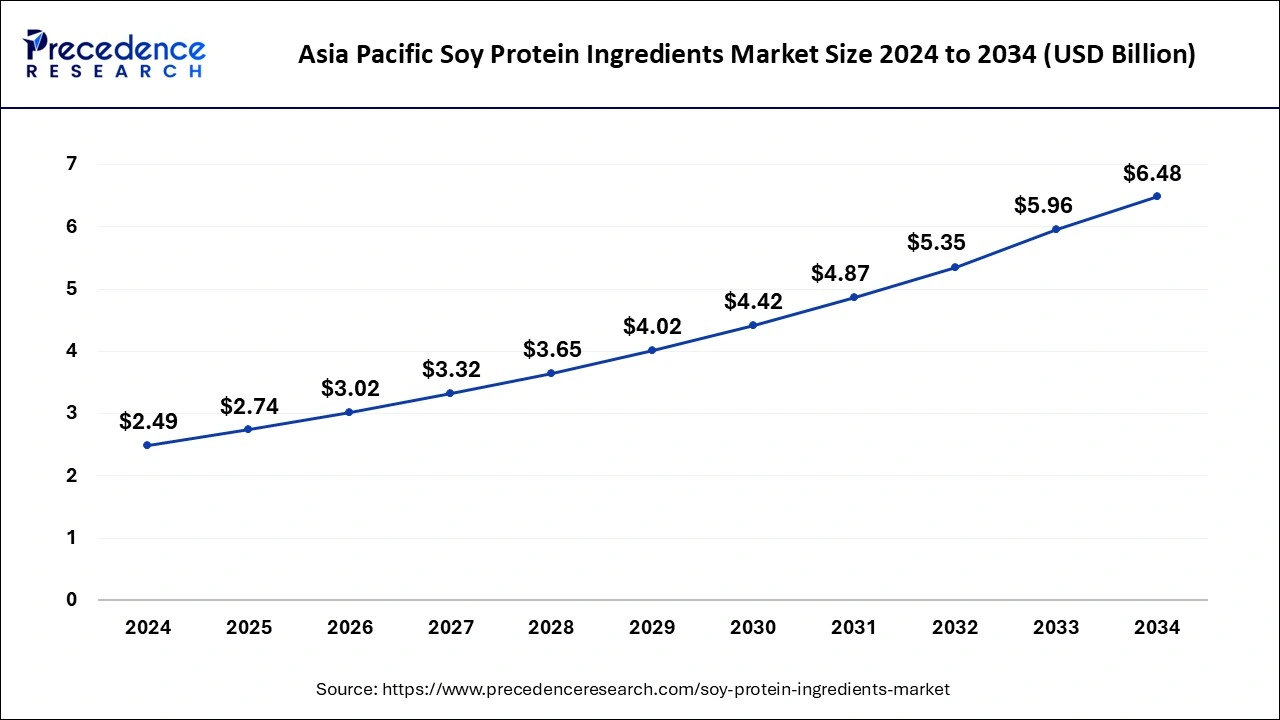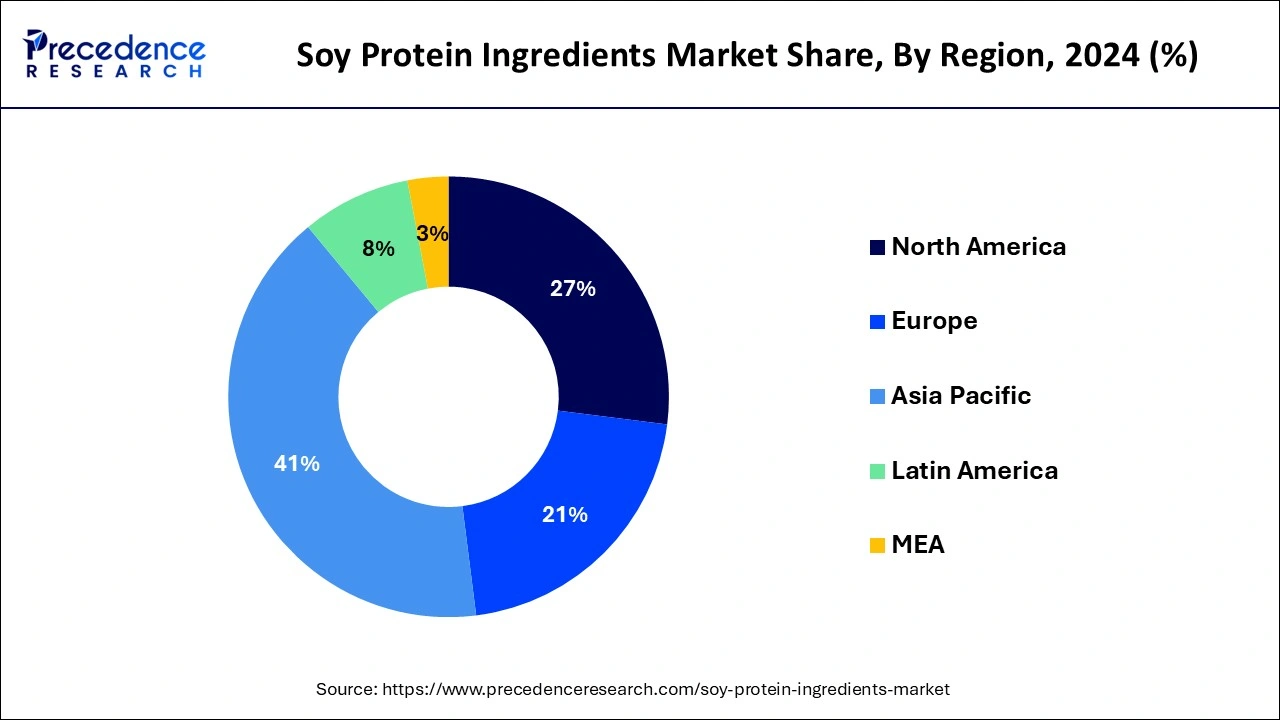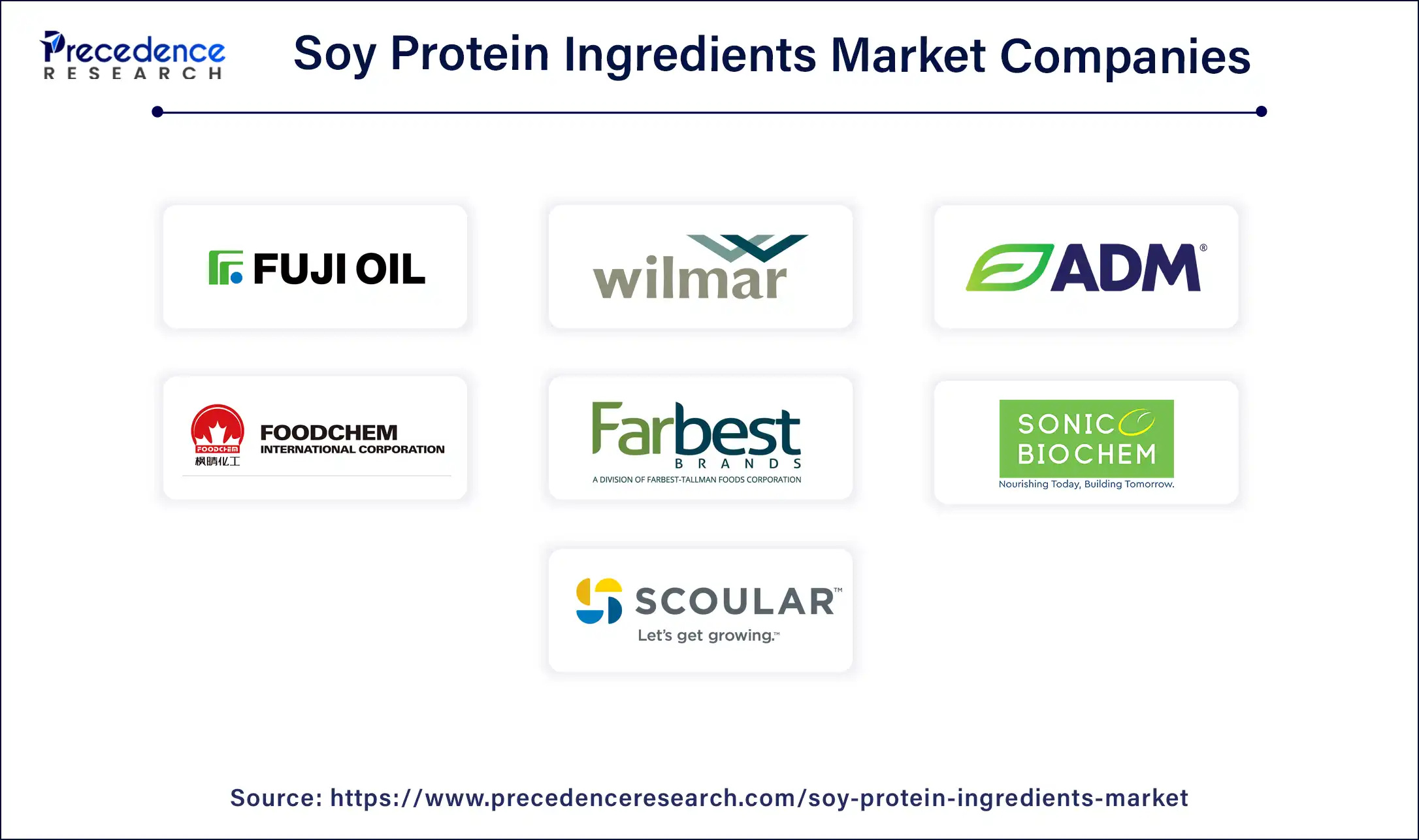What is the Soy Protein Ingredients Market Size?
The global soy protein ingredients market size was estimated at USD 6.68 billion in 2025 and is predicted to increase from USD 7.36 billion in 2026 to approximately USD 16.88 billion by 2035, expanding at a CAGR of 9.71% from 2026 to 2035. The rising demand for natural protein sources is driving the growth of the market.

Soy Protein Ingredients Market Key Takeaways
- The global soy protein ingredients market was valued at USD 6.68billion in 2025.
- It is projected to reach USD 16.88billion by 2035.
- The soy protein ingredients market is expected to grow at a CAGR of 9.71% from 2026 to 2035.
- Asia Pacific domianted the market with the largest revenue share of 41% in 2025.
- North America is observed to grow at a notable rate during the forecast period.
- By product, the isolate segment has generated more than 50% of revenue share in 2025.
- By nature, the organic segment held the largest share of the market in 2025
- By type, the GMO type segment led the market with the largest share in 2025.
- By application, the food and beverages segment dominated the soy protein ingredient market in 2025.
Market Overview
Soy protein is a healthy, environmentally friendly, and cost-effective solution to animal-based protein sources. It derives from the soybeans, that can be harvested and processed into high protein products like soy concentrators, soy flour, soy milk, and soy isolated that can be used in the production of soy protein ingredients. Soy protein is highly nutritious to the human body and known as the most cost-efficient source of protein. The increasing inclination towards vegetarian food and vegan diet as the regular lifestyle is driving the demand for the soy protein ingredients for catering the protein demand of vegetarian and vegan population. These ingredients are highly used in packaged products that also boost the growth of the market.
Artificial Intelligence: The Next Growth Catalyst in Soy Protein Ingredients
AI is transforming the soy protein ingredients industry by optimizing production, improving quality control, and accelerating research and development. Machine learning algorithms analyze vast datasets to identify optimal processing parameters, leading to higher yields and better-functioning soy-based proteins. In R&D, AI accelerates the creation of new formulations, such as plant-based meat alternatives, by predicting optimal ingredient combinations that mimic animal products.
Soy Protein Ingredients Market Growth Factors
- The rising inclination towards vegetarian and vegan diet due to the rising concern towards animal welfare and living rights that driving the demand for the soy protein ingredients market.
- The increasing demand for the plant-based certified vegan protein source in the various regions of the world is driving the demand for the soy protein ingredients.
- The rising demand for plant-based protein and antibiotic meats that further driving the growth of the market.
- The increasing demand for soy protein ingredients in the infants (baby) food and in packaged food products is driving the expansion of the soy protein ingredients market.
- The demand for the high in nutrients and cost-effective alternative to the animal-based protein is further contributing to the expansion of the market.
- The rising investment in research and development activities in the development and innovations of sustainable, environmentally friendly and cost-effective alternative to animal-based protein is driving the growth of the market.
Market Outlook
- Market Growth Overview: The soy protein ingredients market is expected to grow significantly between 2025 and 2034, driven by the rising sport nutrition demand, growing plant-based shift and health awareness, and their widespread functional applications.
- Sustainability Trends: Sustainability trends involve regenerative agriculture and water efficiency, non-GMO and organic expansion, and clean label initiatives.
- Major Investors: Major investors in the market include ADM, Cargill Incorporated, Wilmar International Limited, Bunge Global SA, and CHS Inc.
Soy Protein Ingredients Market Scope
| Report Coverage | Details |
| Market Size by 2035 | USD 16.88Billion |
| Market Size in 2025 | USD 6.68Billion |
| Market Growth Rate from 2026 to 2035 | CAGR of 9.71% |
| Largest Market | Asia Pacific |
| Base Year | 2025 |
| Forecast Period | 2026 to 2035 |
| Segments Covered | Product, Nature, Type, Application, and Regions |
| Regions Covered | North America, Europe, Asia-Pacific, Latin America, and Middle East & Africa |
Market Dynamics
Driver
Diversion into the vegetarian and vegan diet
The rising awareness about the environmentally free and sustainable food product that less harmful for the body and the environment is driving the demand for the market. The rising number of populations diverting into the non-veg to vegetarian and vegan lifestyle is diving the demand for the soy based food products for catering their regular protein requirements. Soy is majorly used as the alternative or plant-based source of protein to the meat. Soy is used for the production of food products like tofu, soy milk, tempeh, and other soy based meat and dairy alternative products. The rising inclination towards the vegan diet by the people is highly contributing in the demand for the soy protein ingredients market.
Restraint
Competition from alternative proteins
Soy cultivation has been associated with deforestation, particularly in regions like the Amazon rainforest. Environmental concerns and the push for more sustainable agricultural practices can affect the perception and marketability of soy protein ingredients. The rise of alternative protein sources, such as pea protein, rice protein, and insect protein, provides significant competition. These alternatives are often marketed as being more sustainable or having different health benefits, which can sway consumer preference away from soy protein.
Opportunity
Integration of soy protein in skincare products
Soy protein is a beneficial product that can be added to a skincare routine. The increasing adoption of soy protein ingredients in skincare and cosmetics products due to their advantageous properties for maintaining healthy and younger-looking skin opens up a sustainable opportunity for the entire industry. Soy protein is a rich source of arginine, amino acids, and glutamine that helps maintain healthy, youthful skin. Soy protein also has essential components such as Vitamin E, protecting the skin from radical damage.
It is an excellent choice for removing acne, scars, and sensitive skin issues; it has incredible anti-inflammatory properties that make it suitable for reducing irritation and redness in the skin. Major skincare and cosmetics brands are using organic materials to produce their products, further driving growth opportunities in the soy protein ingredients market.
Segment Insights
Product Insights
The soy isolate segment dominated the soy protein ingredients market with the largest share in 2025. Soy isolate is a highly nutritious and cost-effective protein obtained fromsoybeans. Soy isolates are widely adopted as they help reduce weight, build muscles, and boost energy, acting as a nutritious factor for the human body. Soy protein isolated is an efficient protein used to improve the overall health of the human body. Soy protein isolate also helps maintain and manage hormonal balance and decreases the risk of heart disease, breast cancer, and osteoporosis.
Soy protein isolates are an overall combination of vitamins and minerals and do not require any additional nutrition. They have several health benefits, such as helping to lower cholesterol levels. Soy protein is a healthier substitute for protein for vegan and vegetarian people. Soy protein is a plant-based protein that makes cardiovascular conditions stable and healthy.
Soy protein isolates are generally known for improving gastrointestinal health, though they have a good amount of soy fiber. The rising consumption of soy protein isolates by people in their regular diets, such as breakfast cereal, baby foods, and processed meats, acts as a growth factor for the segment's overall growth.
Nature Insights
The organic segment held the largest soy protein ingredients market share in 2025. The segment's growth is attributed to the rising preference towards vegetarian and vegan diets and sustainable lifestyles driving the inclination towards organic food. Soy protein is a fully organic product made from plant-based protein, including all essential amino acids, with the overall nutrition that makes the human body healthy. Organic plant-based protein has lower heart-harming saturated fats, is free of antibiotics and harmful bacteria, and is easier to digest.
The organic plant-based protein makes the body firmer and youthful for a more extended period. There are several health benefits associated with organic plant-based protein; the body quickly absorbs it, though it is easily digestible; it is a good source of iron, loaded with healthy fats and healthy guts, and helps in life-loving. The rising demand for organic food products is contributing to expanding the soy protein ingredients market.
Type Insights
The GMO-type segment dominated the soy protein ingredients market in 2025. GMOs are genetically modified organisms that are processed proteins obtained from soybeans. This type of protein is genetically modified to produce specific desired traits like resistance to herbicides or pests. GMO soy protein is used in food products such as protein bars, processed foods, and dietary supplements. GMO soy protein is also one of the best alternative sources of protein to animal-based protein. GMO soy protein carries another benefit: adding the emulsifier to the packed food products helps mix the ingredients. The GMO emulsifier is used in products like mayonnaise, salad dressings, and baked foods.
Application Insights
The food and beverages segment dominated the soy protein ingredients market in 2025. The market's growth is due to the rising demand for plant-based protein in various food and beverage products as an alternative to animal-based protein, emulsifiers, and protein sources. Soy protein is an excellent source of nutrition, vitamins, and minerals to keep the body healthy. Soy protein has additional benefits, such as managing hormonal changes and reducing the risk of heart issues and some types of cancer. Soy protein is added to various food products due to its unique functional and nutritious quality and good quality protein. Soy can be used as a fat substitute in food products like fish, cereal-based products, and milk. Most food and beverage companies use soy protein ingredients to improve the overall quality of their food products.
Regional Insights
What is the Asia Pacific Soy Protein Ingredients Market Size?
The Asia Pacific soy protein ingredients market size was exhibited at USD 2.74 billion in 2025 and is projected to be worth around USD 7.06 billion by 2035, poised to grow at a CAGR of 9.93% from 2026 to 2035.

Asia Pacific led the soy protein ingredients market with the largest market share in 2025. The region is observed to sustain the position during the forecast period. The growth of the market is attributed to the rising demand for the vegetarian source of protein due to the higher number of vegetarian people owing to their choices, religious believe, health conditions, and others are driving the demand for the soy ingredients market. Additionally, the rise in consumption of processed food products, packaged snacks and other food items that driving the demand for soy protein as additive ingredients such as emulsifier, preservative, and others. Available number of food industry players in the region is contributing to the growth of the soy protein ingredients market in the region.
China Soy Protein Ingredients Market Trends
China's health-conscious consumer demand for cholesterol-lowering, plant-based alternatives, and increased environmental awareness. Manufacturers are leveraging dry soy protein forms (isolates and concentrates) and the rapidly expanding organic segment to meet rising demand in both the functional food and meat alternative industries.

North America is expected to witness the fastest growth in the market during the forecast period. The growth of the market is attributed to the rising preferences towards the vegan and vegetarian diet in the people. The rising awareness about the benefits of plant-based protein in the population is driving the growth of the market. The rising adoption of technologies in the food and beverages manufacturing companies and the rising adoption of the soy protein ingredients as an emulsifier in the food products are driving the growth of the soy protein market in the region.
U.S. Soy Protein Ingredients Market Trends
The U.S. industry is moving toward non-GMO and sustainably sourced ingredients for both human sports nutrition and the high-growth pet food sector. Ultimately, soy's superior amino acid profile and functional versatility solidify its role as the premier plant-based foundation.
How Did Europe Experience A Notable Growth in the Soy Protein Ingredients Market?
Europe's high-tech transformation, utilizing high-moisture extrusion to refine textures and align with the EU's Farm to Fork sustainability goals. Led by Germany's immense demand for organic, non-GMO ingredients, the sector is successfully pivoting toward clean-label functional foods and sports nutrition.
Germany Soy Protein Ingredients Market Trends
Germany's shift toward vegan diets and health-conscious consumer demand for sustainable ingredients, manufacturers are leveraging soy for applications ranging from sports nutrition to a surging bakery and confectionery segment. Strict EU regulations enforce a strong preference for non-GMO and traceable sourcing, especially in Germany, ensuring that innovation balances nutritional benefits with stringent clean-label standards.
Value Chain Analysis of the Soy Protein Ingredients Market
- Raw Material Sourcing (Soybean Cultivation)
This initial stage involves the farming and harvesting of soybeans, with major production hubs located in the US, Brazil, Argentina, and China.
Key Players: Bunge Limited, CHS Inc., Archer Daniels Midland Company (ADM), and local farming cooperatives. - Processing & Extraction (Defatting and Cleaning)
Soybeans are transported to crushing plants, where they are cleaned, dehulled, and cracked.
Key Players: ADM, Cargill, Inc., Bunge Limited, and Wilmar International. - Ingredient Manufacturing
The defatted flakes are further processed to increase protein concentration, resulting in three main forms: soy flour (~50% protein), soy protein concentrates (~65-70% protein), and soy protein isolates (90+% protein).
Key Players: Fuji Oil Holdings Inc., International Flavors & Fragrances Inc. (IFF), Crown Soya Protein Group, and Sojaprotein a.d.
Soy Protein Ingredients Market Companies

- Archer Daniels Midland Company: As a global leader, ADM produces a broad range of soy protein concentrates, isolates, and textured proteins for human and animal nutrition.
- The Scoular Company: Scoular supplies specialized, non-GMO soy protein isolates and concentrates to enhance nutrition, texture, and functionality in food and pet food applications.
- Wilmar International Ltd: Wilmar holds a dominant position in the Asia Pacific region, utilizing its extensive supply chain to provide soy protein ingredients for food, bakery, and animal feed industries.
- FUJI OIL HOLDINGS INC.: As a comprehensive soy researcher, Fuji Oil specializes in producing highly functional soy protein isolates and texturized soy proteins (soy meat) that replicate the texture of meat.
- Sonic Biochem Limited: Sonic Biochem focuses on manufacturing a wide range of soy-based ingredients, including soy protein isolates, concentrates, and soy flour, for industrial and food applications.
Other Major Key Players
- Farbest-Tallman Foods Corporation
- Foodchem International Corporation
Recent Developments
- In February 2022, Benson Hill, Inc, a food technology company works on identifying the natural diversity of plants launched TruVail™, a new product that is domestically sources, non-GMO plant-based protein ingredients with unique sustainability benefits.
- In June 2024, Every Co. the American Biotech Startup and Landish, and Canadian functional beverage launched adaptogens and protein-infused matcha mixes and coffee enhancer under the name of FERMY.
- In June 2024, Good Fettle Pvt Ltd announced the launch of groundbreaking began protein brand ‘PodNutrition' that redefines purity, tastes, and nutritional excellence. The PodNutrition is the plant-based supplement offers customers guilt-free indulgence without compromise in quality and flavour.
- In May 2024, Novonesis, a leading player in biological solutions comes in the landmark distribution agreement with the Andermatt Group, a well-known market player in the manufacture and distribution of quality biological solutions enables the access to the Cell-Tech, Novonesis's soybean inoculant to the Southern and Eastern African farmers for the 2024-2025 planting season.
Segments Covered in the Report
By Product
- Concentrates
- Isolates
- Textured
- Flour
By Nature
- Organic
- Conventional
By Type
- GMO
- Non-GMO
By Application
- Food and Beverages
- Animal Feed
By Geography
- North America
- Asia Pacific
- Europe
- Latin America
- Middle East & Africa
For inquiries regarding discounts, bulk purchases, or customization requests, please contact us at sales@precedenceresearch.com
Frequently Asked Questions
Ask For Sample
No cookie-cutter, only authentic analysis – take the 1st step to become a Precedence Research client
 Get a Sample
Get a Sample
 Table Of Content
Table Of Content




 sales@precedenceresearch.com
sales@precedenceresearch.com
 +1 804-441-9344
+1 804-441-9344
 Schedule a Meeting
Schedule a Meeting